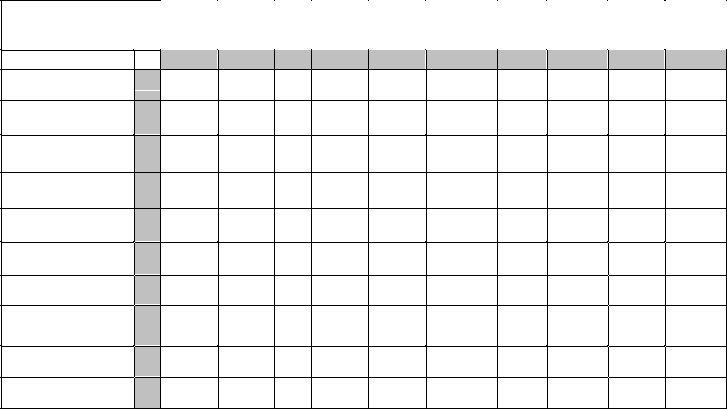The Compatibility Containers form plays a crucial role in ensuring safety and regulatory compliance in the transportation of hazardous materials by sea. It offers a Hazardous Materials Compatibility Chart specifically designed for ocean containers, categorizing substances based on their risk profiles, such as flammable gases, toxic substances, corrosives, and miscellaneous dangerous substances, among others. The chart clearly outlines which materials can be safely loaded together, enhancing cargo safety and minimizing the risk of accidents during transport. The compatibility of different hazardous materials, represented in the form, is governed by specific regulations, ensuring no dangerous combinations are shipped together. Important to note, the form also lists materials that Sea Shipping Line categorically refuses to handle, which includes explosives, dangerous when wet material, organic peroxides, infectious substances, radioactive materials, any hazardous waste, and materials requiring temperature control. This delineation not only serves to protect the ship and its crew but also plays a vital role in safeguarding the environment from potential hazardous spills or leaks. By adhering to these guidelines, shippers and shipping lines can navigate the complexities of hazardous material transport, ensuring compliance with both the International Maritime Dangerous Goods (IMDG) Code and relevant sections of the Code of Federal Regulations (49 CFR 172.101 column 10), thus, making the Compatibility Containers form an indispensable tool in the logistics of hazardous materials by sea.
| Question | Answer |
|---|---|
| Form Name | Compatibility Containers Form |
| Form Length | 1 pages |
| Fillable? | No |
| Fillable fields | 0 |
| Avg. time to fill out | 15 sec |
| Other names | chinese zodiac compatibility chart, chemical compatibility pdf, dangerous goods compatibility and ghs labelling elements display, ocean poisons class |

Hazardous Materials Compatibility Chart
(For Ocean Containers)
Flammable |
Non |
Poison |
Flammable |
Flammable |
Spontaneous |
|
Toxic |
|
Misc. |
|
Flammable |
Oxidizers |
Substances |
Corrosives |
Dangerous |
||||||
Gases |
Gases |
Liquids |
Solids |
Combustibles |
||||||
Gases |
|
(Poisons) |
|
Substances |
||||||
|
|
|
|
|
|
|
||||
|
|
|
|
|
|
|
|
|
|
Flammable
Gases
Non Flammable Gases
Poison
Gases
Flammable
Liquids
Flammable
Solids
Spontaneous
Combustibles
Oxidizers
Toxic Substances
(Poisons)
Corrosives
Misc. Dangerous
Substances
Class
2.1
2.2
2.3
3
4.1
4.2
5.1
6.1
8
9
2.1
Yes
Yes
Yes
No
No
No
No
Yes
No
Yes
2.2
Yes
Yes
Yes
No
Yes
No
Yes
Yes
Yes
Yes
2.3
Yes
Yes
Yes
No
Yes
No
Yes
Yes
Yes
Yes
3
No
No
No
Yes
Yes
No
No
Yes
Yes
Yes
4.1
No
Yes
Yes
Yes
Yes
No
No
Yes
No
Yes
4.2
No
No
No
No
No
Yes
No
No
No
Yes
5.1
No
Yes
Yes
No
No
Yes
Yes
No
No
Yes
6.1
Yes
Yes
Yes
Yes
Yes
No
No
Yes
Yes
Yes
8
No
Yes
Yes
Yes
No
No
No
Yes
Yes
Yes
9
Yes
Yes
Yes
Yes
Yes
Yes
Yes
Yes
Yes
Yes
Yes = at the horizontal and vertical columns indicates materials that maybe be loaded together depending on the commodity.
No = at the horizontal and vertical columns indicates materials that cannot be loaded together (provided individual schedule is allowed by IMDG & 49 CFR [172.101 column 10] )
Sea Shipping Line does NOT accept the following hazardous materials:
1.Explosives (Class 1)
2.Dangerous When Wet Material (Class 4.3)
3.Organic Peroxides (Class 5.2)
4.Infectious Substances (Class 6.2)
5.Radioactive Materials (Class 7)
6.Hazardous Waste Materials (any)
7.Hazardous Materials Requiring Temperature Control